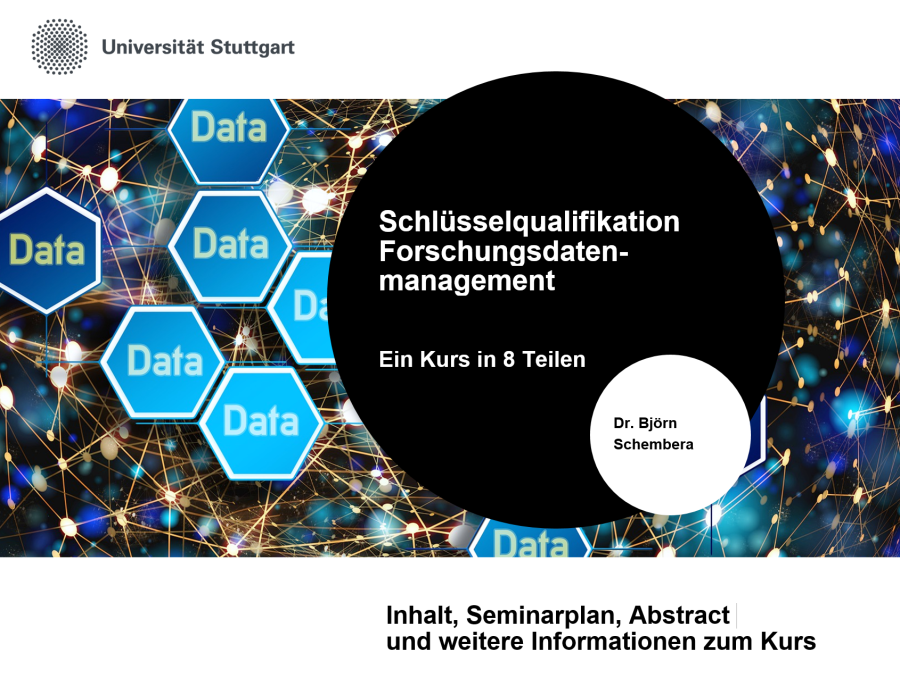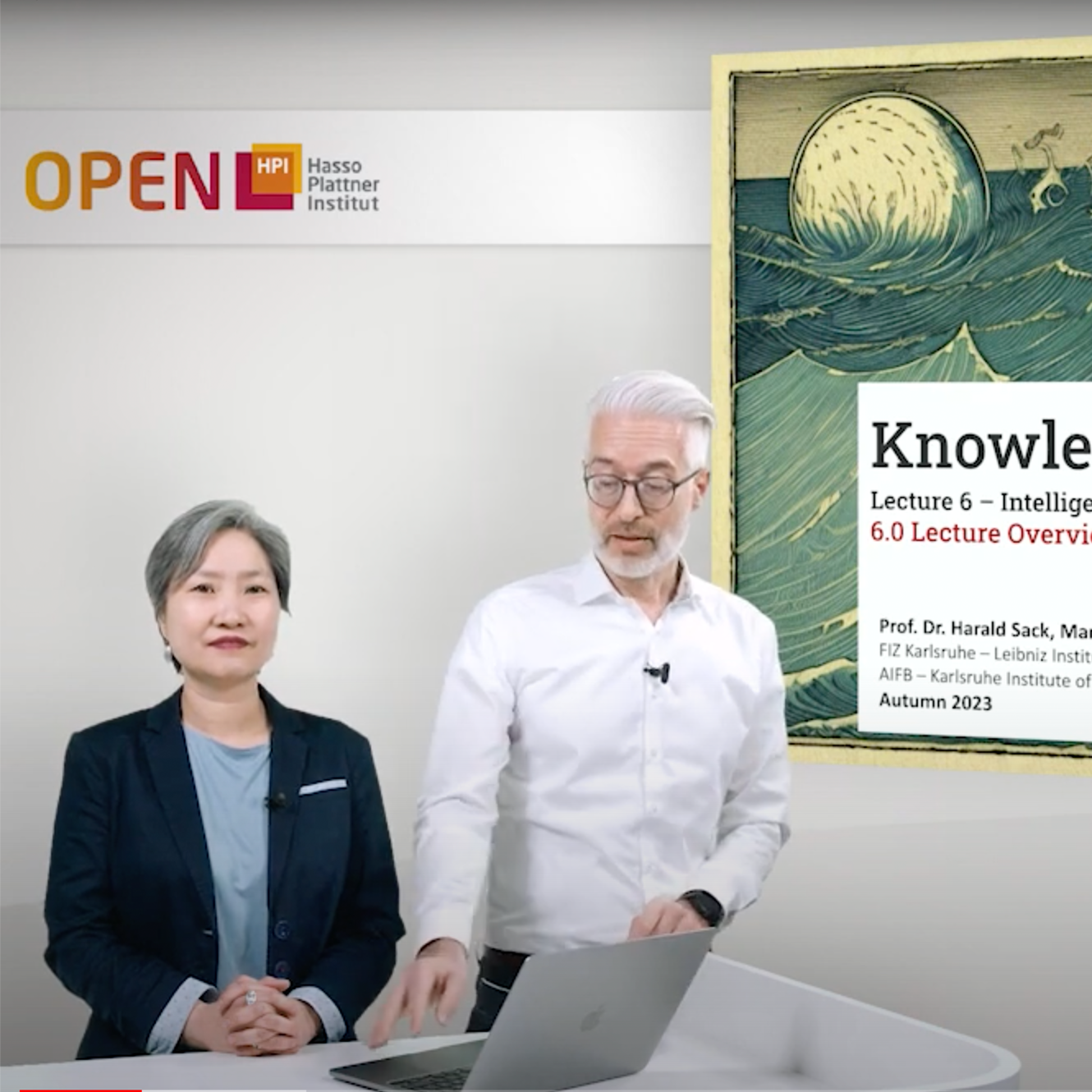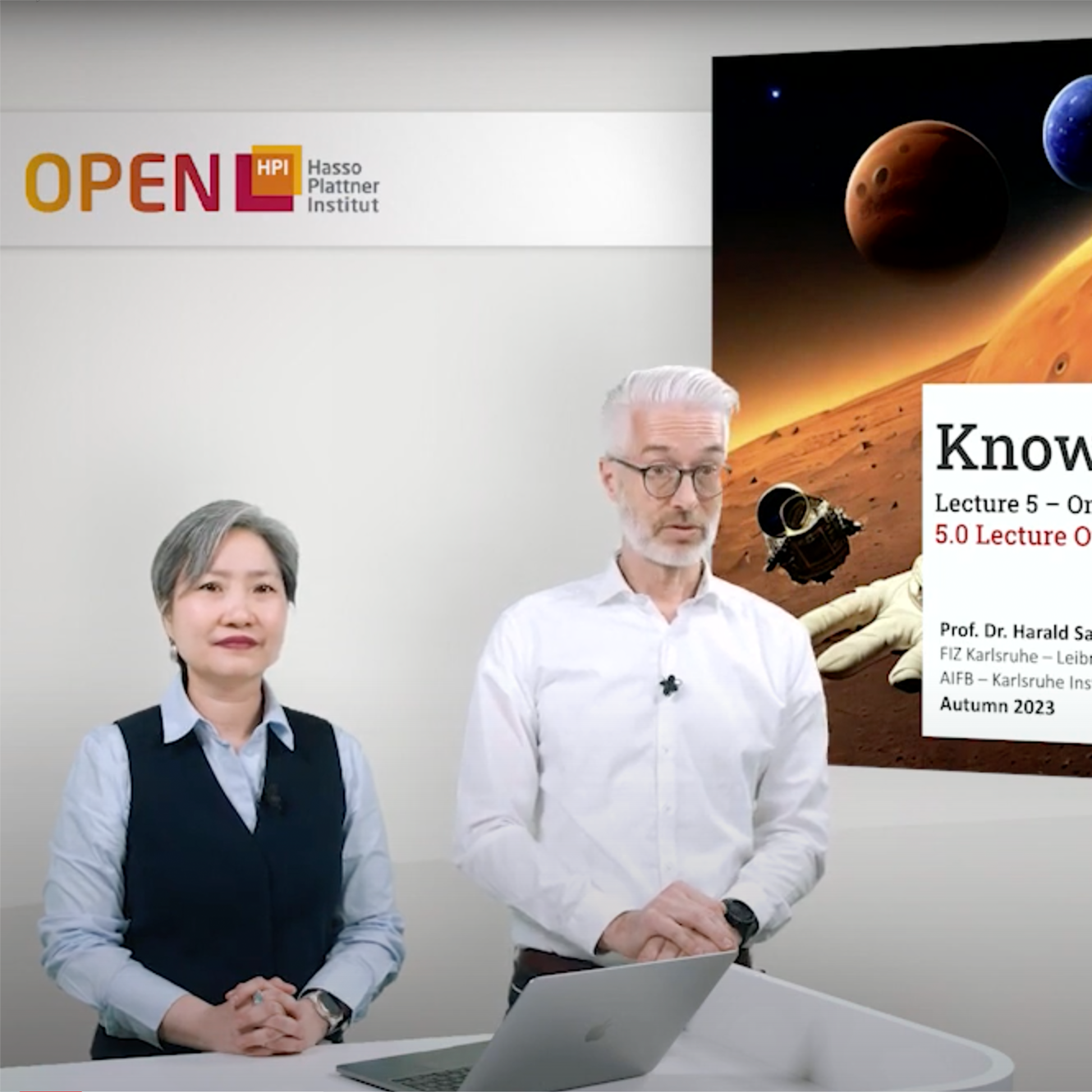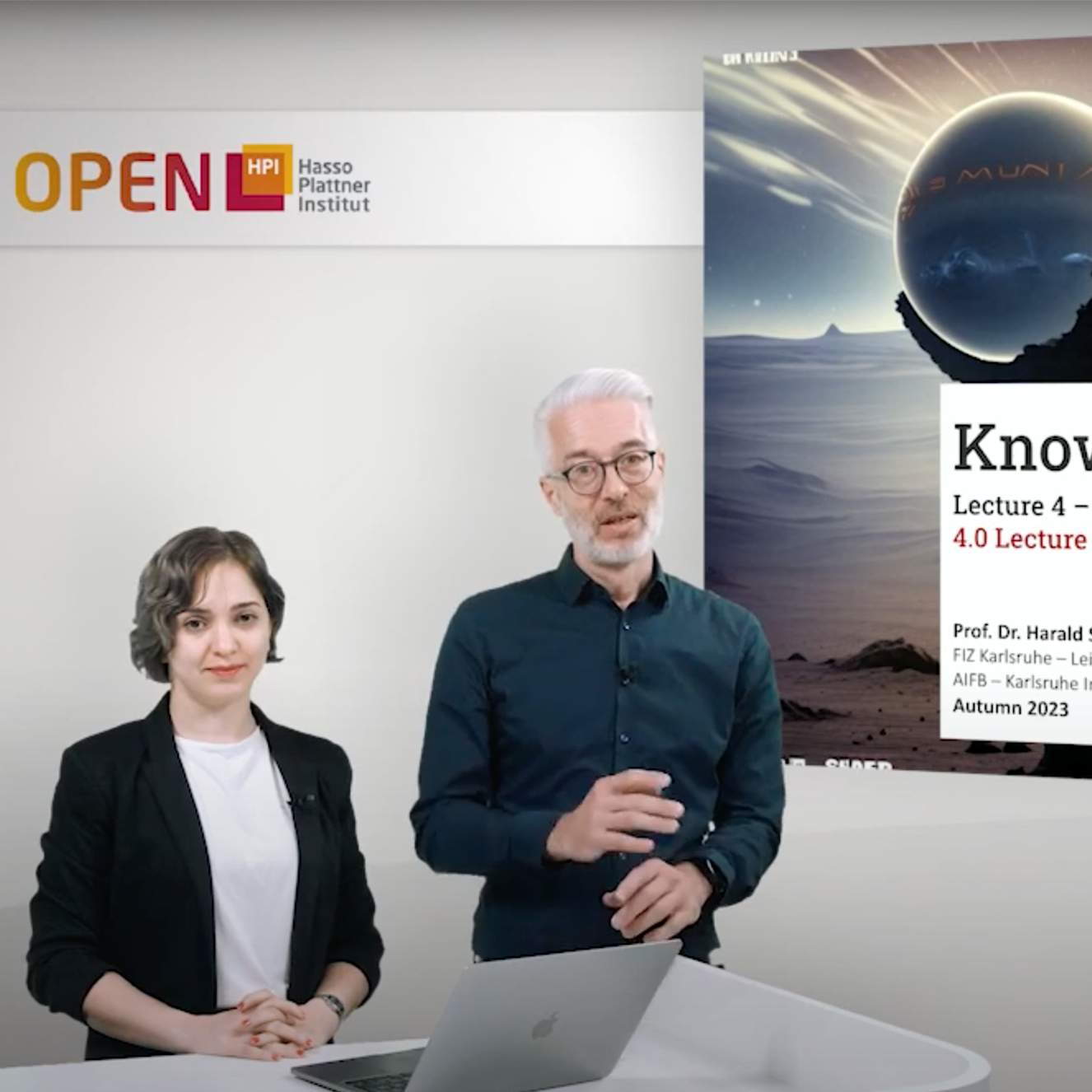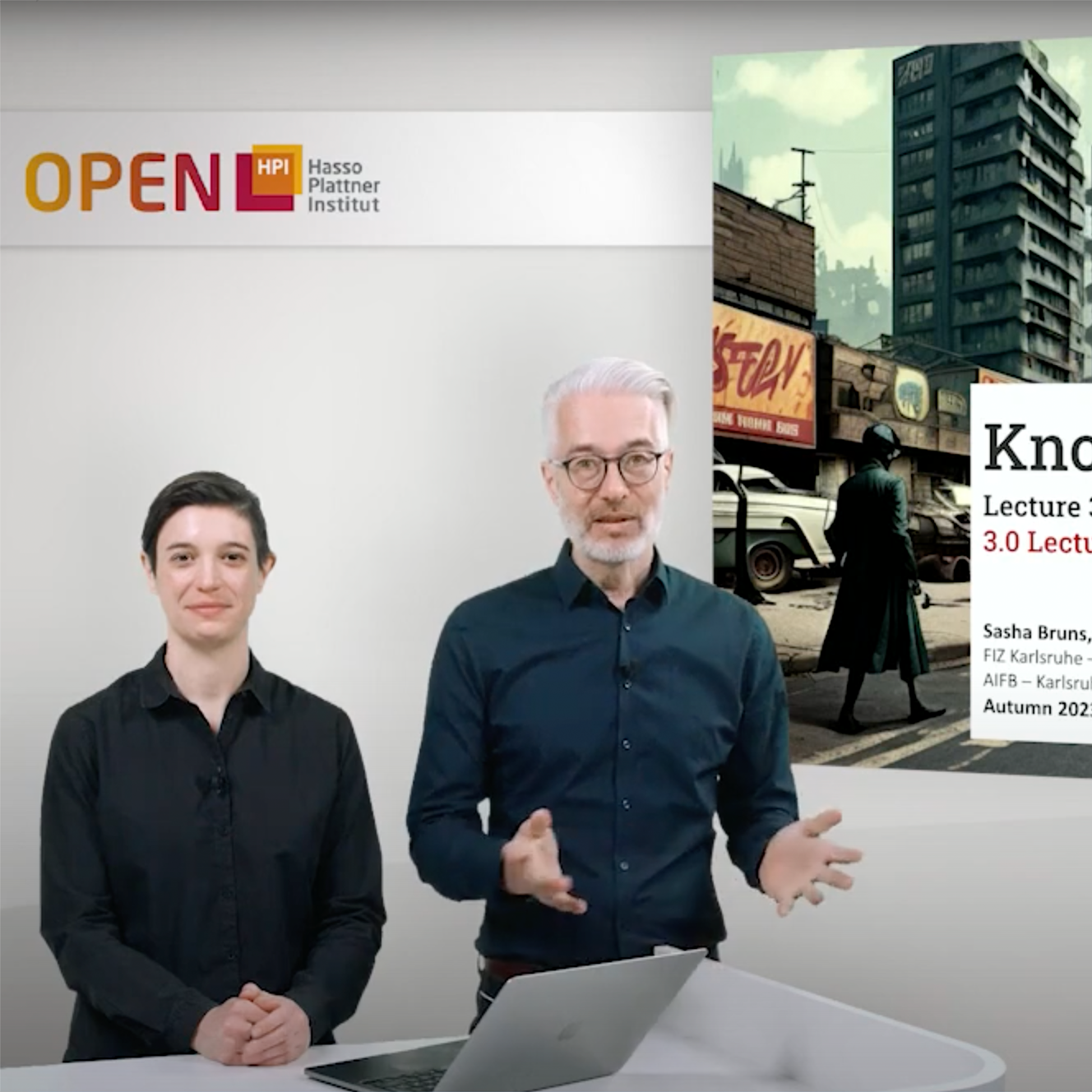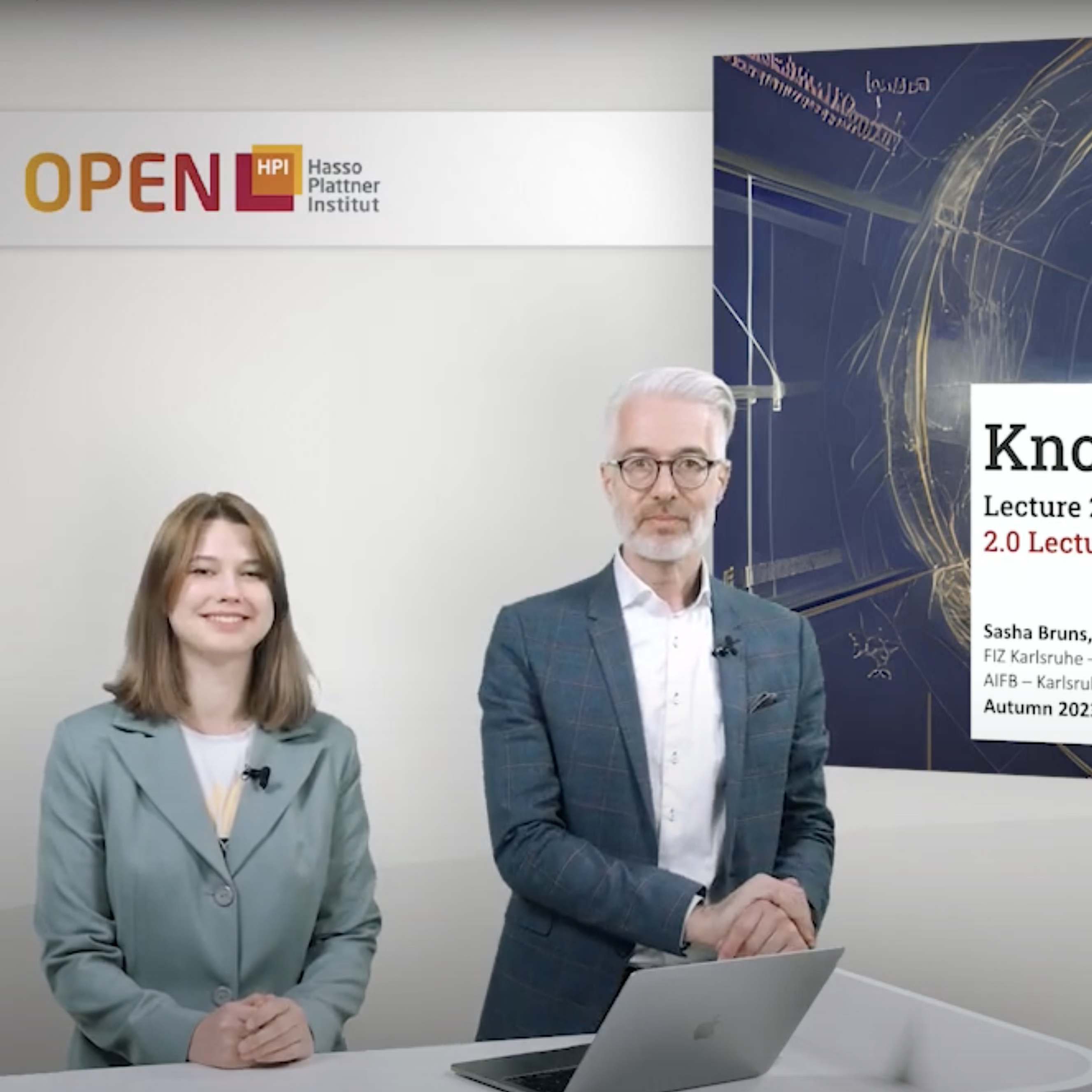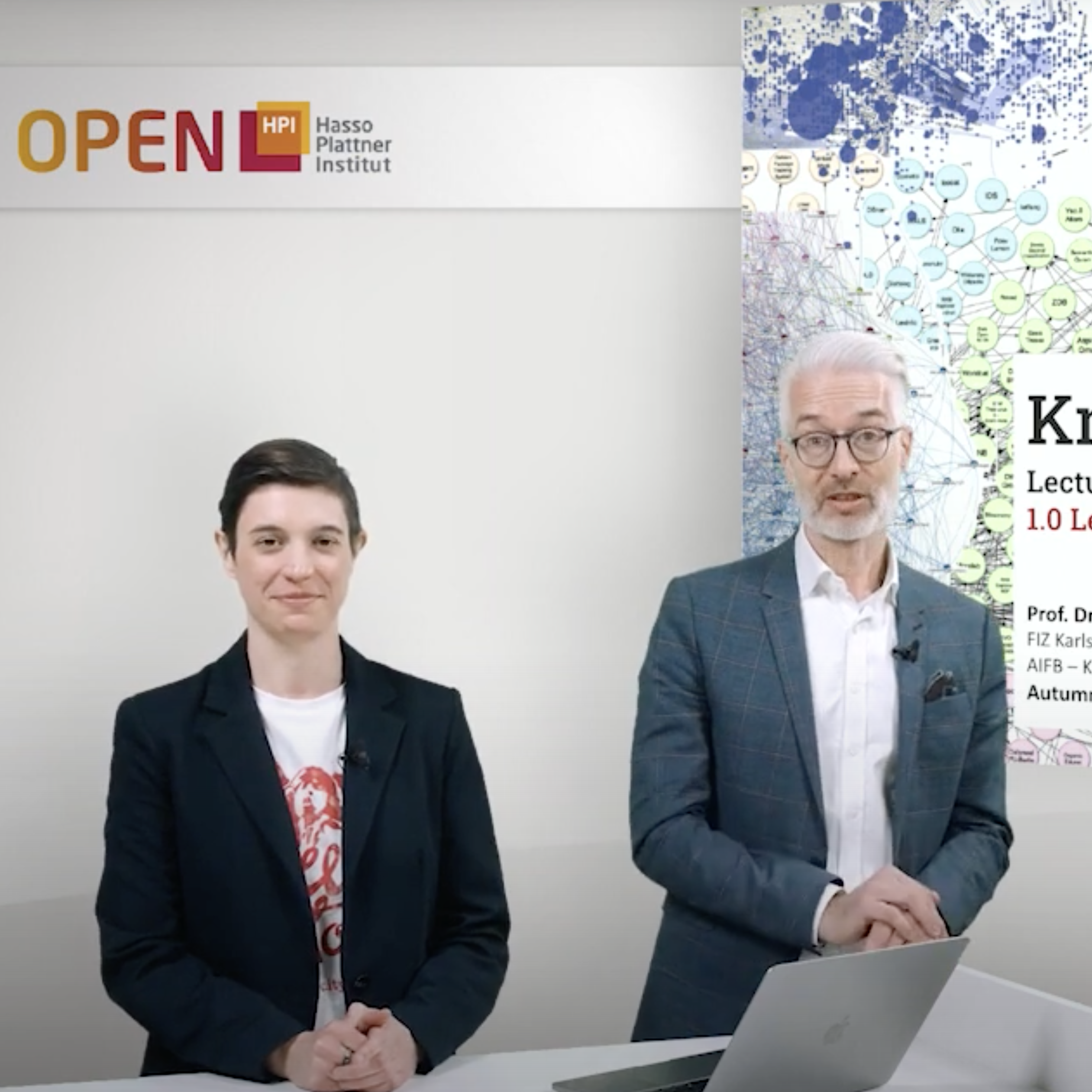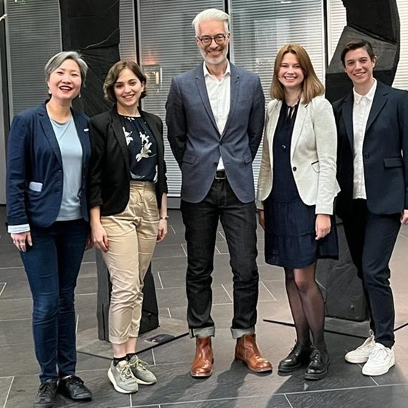Teaching and Training
Video tutorials, online courses and training resources
Der Kurs Forschungsdatenmanagement wurde im Wintersemester 2023/2024 an der Universität Stuttgart als fachübergreifende Schlüsselqualifikation zum ersten Mal abgehalten.
Die Einordnung in solch ein fachübergreifendes, kompetenzorientierten Curriculum spiegelt die Interdisziplinarität des Themas und seine Relevanz in vielen Fachbereichen wider. Studierende aus nahezu allen Bereichen benötigen Kompetenzvermittlung im Umgang mit Forschungsdaten, die sie früher oder später selbst nutzen, nachnutzen, erzeugen oder bereitstellen müssen – spätestens bei der Erstellung eigener studentischer Arbeiten. Der Kurs richtet sich an Studierende, kann aber auch für Promovierende, Forschende oder weitere Zielgruppen genutzt und angepasst werden und ist entsprechend lizensiert.
1.
Einführung & Seminarplan
2.
Daten – Information – Wissen
3.
Gute Wissenschaftliche Praxis und die FAIR Prinzipien
4.
Umsetzung: Datenspeicherung und Daten teilen
5.
Umsetzung: Datendokumentation und semantische Technologie
6.
Datenmanagementpläne
7.
Lizenzen, Recht und Ethik
8.
Dunkle Daten, Reproduzierbarkeit und Open Science
Dr.-Ing. Björn Schembera
www.ians.uni-stuttgart.de/...
6.0
Lecture Overview
6.1
The Graph in Knowledge Graphs
Excursion 8
Distributional Semantics and Language Models
6.2
Knowledge Graph Embeddings
6.3
Knowledge Graph Completion
6.4
Knowledge Graphs and Language Models
6.5
Semantic Search
6.6
Exploratory Search and Recommender Systems
Hands-On
6.1
NetworkX
6.2
AmpliGraph
Note:
In the captions under each video you will find a Zenodo link to download the presentation slides.
Prof. Dr. Harald Sack
+49 7247 808 195
harald.sack@fiz-karlsruhe.de
5.0
Lecture Overview
5.1
Beyond the Limits of OWL
Excursion 7
The Semantic Web Rule Language SWRL
5.2
How to Design Your Own Ontology
5.3
How to Design Better Ontologies
5.4
Ontological Engineering
5.5
Knowledge Graph Construction
5.6
Ontologies & Knowledge Graphs – Best Practices
Hands-On
5.1
NLP and Knowledge Graph Construction
5.2
OpenRefine
5.3
SWRL in Protégé
Note:
In the captions under each video you will find a Zenodo link to download the presentation slides.
Prof. Dr. Harald Sack
+49 7247 808 195
harald.sack@fiz-karlsruhe.de
4.0
Lecture Overview
4.1
From Aristotle to AI: Exploring Ontologies in Computer Science
4.2
The crucial Role of Mathematical Logic
Excursion 5
Essential Logics in a Nutshell
Excursion 6
Description Logics
4.3
The Web Ontology Language OWL
4.4
From simple to complex: Scaling up with OWL
4.5
Unlocking the Potential of OWL
Hands-On
4.1
Ontology Creation with Protégé
4.2
Reasoning in Protégé
Note:
In the captions under each video you will find a Zenodo link to download the presentation slides.
Prof. Dr. Harald Sack
+49 7247 808 195
harald.sack@fiz-karlsruhe.de
3.0
Lecture Overview
3.1
How to query RDF(S)
Excursion 3
DBpedia Knowledge Graph
Excursion 4
Wikidata Knowledge Graph
3.2
Complex Queries with SPARQL
3.3
More Complex Queries with SPARQL
3.4
SPARQL Sub-Select and Property Paths
3.5
SPARQL is more than a Query Language
3.6
Quality Assurance with SHACL Constraints
Hands-On
3.0
Overview
3.1
Querying Knowledge Graphs with SPARQL - Wikidata
3.2
Querying Knowledge Graphs with SPARQL - DBpedia
3.3
SPARQL Query Federation
Note:
In the captions under each video you will find a Zenodo link to download the presentation slides.
Prof. Dr. Harald Sack
+49 7247 808 195
harald.sack@fiz-karlsruhe.de
2.0
Lecture Overview
2.1
How to identify and access Things
2.2
How to Represent Simple Facts with RDF
2.3
RDF Turtle Serialization
2.4
Vocabularies and Model Building with RDFS
2.5
RDF Complex Data Structures
Excursion 1
Reification and RDF*
2.6
Logical Inference with RDF(S)
Excursion 2
RDFa - RDF and the Web
Hands-On
2.1
RDFLib - RDF Serialisation and Visualisation
2.2
RDFLib - RDF Graph Manipulation
Note:
In the captions under each video you will find a Zenodo link to download the presentation slides.
Prof. Dr. Harald Sack
+49 7247 808 195
harald.sack@fiz-karlsruhe.de
1.0
Lecture Overview
1.1
From Data to Knowledge
1.2
Knowledge and how to represent it
1.3
The Art of Understanding
1.4
Graphs and Triples
1.5
Knowledge Graphs
1.6
The Semantic Web
1.7
Linked Data and the Web of Data
Hands-On
1.1
Graph Creation from Text
1.2
The Art of Understanding: Natural Language Processing
1.3
NLP Ambiguities
Note:
In the captions under each video you will find a Zenodo link to download the presentation slides.
Prof. Dr. Harald Sack
+49 7247 808 195
harald.sack@fiz-karlsruhe.de
When we ask Alexa about tomorrow's weather or use Google to look up the latest news on climate change, knowledge graphs serve as the foundation of today's cutting-edge information systems. In addition, knowledge graphs have the potential to elucidate, assess, and substantiate information produced by Deep Learning models, such as Chat-GPT and other large language models. Knowledge graphs have a wide range of applications, including improving search results, answering questions, providing recommendations, and developing explainable AI systems. In essence, the purpose of this course is to provide a comprehensive overview of knowledge graphs, their underlying technologies, and their significance in today's digital world.
A Knowledge Graph is a structured representation of knowledge used to provide a comprehensive and interconnected view of a specific domain. The FAIRification process of research data relies heavily on Knowledge Graphs, which serve as foundational elements of modern information systems. However, for individuals lacking a computer science background, comprehending the concept of Knowledge Graphs can be challenging, preventing them from creating or participating in its development. To overcome this, we suggest taking the OpenHPI course "Knowledge Graphs – Foundations and Applications" for anyone interested in the subject.
This programme will provide all the essential knowledge needed to design, execute, and utilise Knowledge Graphs. The course will concentrate on fundamental semantic technologies, such as the principles of knowledge representation and symbolic AI. This encompasses encoding information via RDF triples, representing knowledge through ontologies using OWL, performing efficient queries on Knowledge Graphs by means of SPARQL, expressing latent knowledge in vector spaces, and utilizing knowledge graphs in sophisticated information systems, such as semantic and exploratory search. Furthermore, this course will discuss the role of knowledge graphs in artificial intelligence and machine learning, as well as their potential to improve the explicability and trustworthiness of "black box" deep learning models such as Chat-GPT.
Detailed information:
open.hpi.de/...
Participation is free of charge. Come and join us!
Prof. Dr. Harald Sack
+49 7247 808 195
harald.sack@fiz-karlsruhe.de
